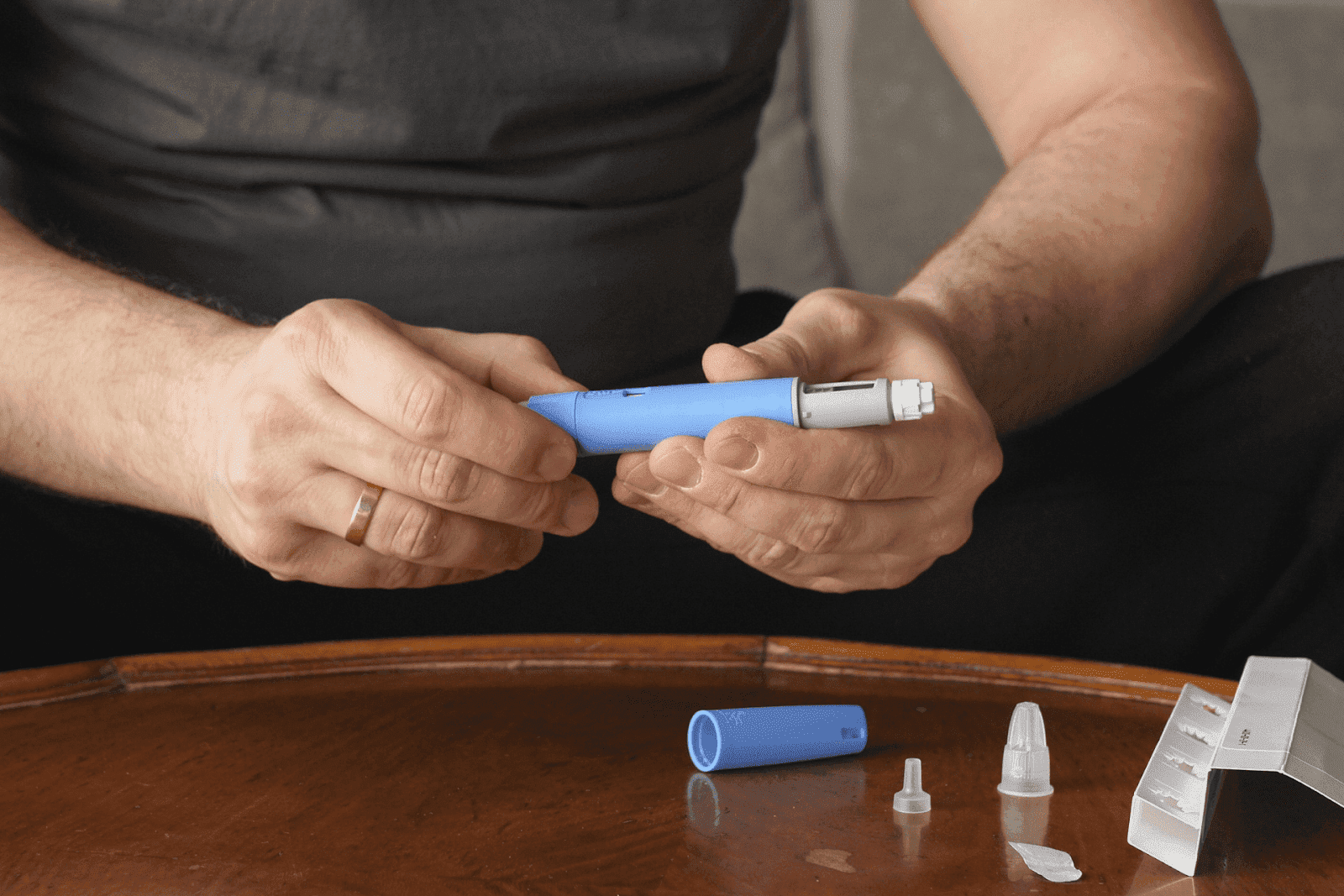Is Tirzepatide the Same as Ozempic?
Understanding Tirzepatide and Ozempic: What Are They?Tirzepatide and Ozempic are two medications that have gained significant attention in the treatment of type 2 diabetes [...]
Read More
Medically reviewed by Alan Lucks | MD, Alan Lucks MDPC Private Practice - New York on October 15th, 2025.
Tirzepatide activates both GLP-1 and GIP hormone receptors for dual action, while Ozempic (semaglutide) only targets GLP-1 receptors—this dual mechanism often delivers superior results.
Clinical studies show tirzepatide users achieve up to 22% body weight reduction compared to Ozempic's typical 15-17%, with better A1C improvements averaging 2.4% versus 1.9%.
Both require weekly subcutaneous injections and cause similar gastrointestinal side effects—nausea affects 20-30% of patients initially but usually subsides within 4-8 weeks.
Insurance coverage favors Ozempic due to its 2017 FDA approval versus tirzepatide's 2022 approval, potentially creating $200-400 monthly cost differences depending on your plan.
Providers typically start tirzepatide at 2.5mg weekly and titrate up every 4 weeks, while Ozempic begins at 0.25mg—both reach maximum doses around 12-16 weeks.
Tirzepatide and Ozempic are two medications that have gained significant attention in the treatment of type 2 diabetes and related metabolic conditions. Both belong to a class of drugs known as incretin mimetics, which help regulate blood sugar levels by enhancing the body's natural insulin response. However, despite some similarities, they are distinct drugs with different mechanisms and benefits.
Ozempic, whose generic name is semaglutide, is a glucagon-like peptide-1 (GLP-1) receptor agonist. It works by stimulating insulin secretion when blood sugar levels are high, slowing gastric emptying, and reducing appetite. This combination helps patients manage blood sugar and often leads to weight loss.
Tirzepatide, on the other hand, is a newer medication that acts as a dual glucose-dependent insulinotropic polypeptide (GIP) and GLP-1 receptor agonist. This dual action means it not only mimics GLP-1 like Ozempic but also activates GIP receptors, potentially offering enhanced blood sugar control and weight loss benefits.
One of the key advantages of tirzepatide is its ability to target multiple pathways involved in glucose metabolism. By simultaneously stimulating both GIP and GLP-1 receptors, tirzepatide may lead to a more robust insulin response and improved glycemic control compared to traditional GLP-1 receptor agonists. This innovative approach has shown promising results in clinical trials, where patients experienced significant reductions in HbA1c levels and notable weight loss, making it an attractive option for those struggling with obesity and diabetes.
Moreover, the administration of these medications also varies, with Ozempic typically requiring a once-weekly injection, while tirzepatide is also administered weekly but may offer a more flexible dosing schedule in the future. Patients often appreciate the convenience of less frequent dosing, which can enhance adherence to treatment regimens. As research continues, the potential for these medications to not only manage diabetes but also improve overall metabolic health is a topic of great interest, paving the way for more comprehensive treatment strategies in the management of type 2 diabetes.
 How Tirzepatide Differs from Ozempic
How Tirzepatide Differs from OzempicThe most significant difference between Tirzepatide and Ozempic lies in their receptor targets. While Ozempic focuses solely on GLP-1 receptors, Tirzepatide targets both GLP-1 and GIP receptors. This dual mechanism may provide more comprehensive metabolic benefits, including better glucose regulation and potentially greater weight loss. The GIP receptor, which is also involved in insulin secretion and appetite regulation, enhances the overall effectiveness of Tirzepatide, making it particularly appealing for those who are looking to manage their diabetes while also addressing weight-related issues.
Clinical trials have shown that Tirzepatide can lead to more pronounced reductions in HbA1c (a marker of long-term blood sugar control) and body weight compared to GLP-1 receptor agonists alone. This makes Tirzepatide an exciting development in diabetes care, especially for patients who struggle with both blood sugar control and obesity. Furthermore, the results from these trials indicate that Tirzepatide may also have a beneficial impact on cardiovascular health, which is a crucial consideration for many individuals with type 2 diabetes, as they are at a higher risk for heart-related complications.
Both medications share common side effects such as nausea, vomiting, and gastrointestinal discomfort, especially during the initial weeks of treatment. However, because Tirzepatide is a newer drug, ongoing research is still assessing its long-term safety profile. Patients considering either medication should discuss potential side effects with their healthcare provider. It's also important to note that individual responses to these medications can vary significantly; while some patients may experience mild side effects that diminish over time, others may find them more challenging to tolerate.
In addition to the common side effects, some studies have suggested that Tirzepatide may have a different tolerability profile compared to Ozempic, with some patients reporting a more gradual onset of gastrointestinal symptoms. This could potentially lead to better adherence to treatment over time, as patients may feel more comfortable continuing their medication without the fear of severe side effects. As healthcare providers continue to gather data on both medications, they can offer personalized recommendations based on a patient's unique health status, lifestyle, and treatment goals, ensuring that each individual receives the most appropriate care for their diabetes management.
Both Tirzepatide and Ozempic are primarily prescribed for adults with type 2 diabetes who need improved blood sugar control. They are also increasingly used for weight management in people with obesity, even if they do not have diabetes.
Choosing between these medications depends on individual health profiles, treatment goals, and how well patients tolerate each drug. For some, Ozempic’s established track record and once-weekly dosing make it a convenient choice. For others, especially those seeking more robust weight loss or who have not achieved desired results with GLP-1 receptor agonists, Tirzepatide may offer an alternative.
With the rapid evolution of diabetes treatments, having reliable and personalized medical advice is crucial. This is where telehealth services like Doctronic.ai come into play. Doctronic offers AI-powered doctor visits that provide quick, evidence-based answers to health questions, including those about diabetes medications like Tirzepatide and Ozempic.
Doctronic’s AI doctor synthesizes the latest peer-reviewed medical research to give comprehensive and personalized recommendations. Patients can also schedule affordable telehealth video visits with licensed doctors 24/7 across all 50 states, making it easier than ever to get timely medical advice and prescriptions without leaving home.
Recent clinical studies have highlighted the effectiveness of both drugs in managing type 2 diabetes. Ozempic has been a standard treatment for years, demonstrating significant improvements in blood sugar control and cardiovascular outcomes. It has also been approved for weight management under the brand name Wegovy.
Tirzepatide, approved more recently, has shown promising results in clinical trials, often outperforming GLP-1 receptor agonists like Ozempic in reducing HbA1c and body weight. For example, a landmark study published in 2023 showed that patients on Tirzepatide experienced up to a 22% reduction in body weight and greater improvements in blood sugar compared to those on Ozempic.
These findings suggest that Tirzepatide may represent the next generation of diabetes care, although its higher cost and newer status mean it might not yet be the first choice for all patients.
Both medications are administered via subcutaneous injection, typically once a week. This dosing schedule is convenient and helps improve adherence compared to daily medications. However, patients should receive proper training on injection techniques and storage.
Cost can be a significant factor in choosing between Tirzepatide and Ozempic. Ozempic has been on the market longer and may be covered by more insurance plans. Tirzepatide, being newer, might have limited coverage and higher out-of-pocket expenses. Patients should consult with their healthcare providers and insurance companies to understand their options.
Deciding whether Tirzepatide or Ozempic is the right medication involves weighing the benefits, side effects, cost, and personal health goals. Both drugs offer powerful tools for managing type 2 diabetes and obesity, but individual responses can vary.
Patients interested in exploring these treatment options can benefit from the personalized and accessible care available through telehealth platforms like Doctronic.ai. This service combines cutting-edge AI with licensed physicians to provide fast, accurate, and patient-centered care from the comfort of home.
The development of medications like Tirzepatide signals a shift toward more tailored and effective treatments for metabolic diseases. As research continues, patients can expect even more innovative therapies that address multiple pathways involved in diabetes and obesity.
Meanwhile, technologies such as AI-powered telehealth are transforming how patients access care, making it faster and more personalized. Doctronic is at the forefront of this revolution, offering a glimpse into how modern medicine can better serve patients worldwide.
 Empowering Patients with Knowledge and Access
Empowering Patients with Knowledge and AccessUnderstanding the differences between Tirzepatide and Ozempic is essential for making informed health decisions. While both medications improve blood sugar control and aid weight loss, their unique mechanisms and clinical profiles mean that one may be better suited to an individual's needs.
For those navigating these choices, leveraging resources like Doctronic.ai can provide expert guidance and convenient access to care. This ensures patients receive the most up-to-date medical advice tailored to their health journey.
Choosing the right diabetes medication can be complex, but it doesn't have to be. Doctronic, the #1 AI Doctor, is here to revolutionize your healthcare experience. With our AI-powered platform, you can receive free, instant, and personalized medical advice on managing type 2 diabetes and weight loss. Our AI doctor is designed to remember you and provide personalized care, drawing on the latest peer-reviewed medical research. For a more human touch, schedule an affordable telehealth video visit with our doctors, available 24/7 across all 50 states. Over 10 million people have trusted Doctronic for smarter, faster, and more personal healthcare. Skip the line. Talk to an AI Doctor Now, for free.
Tirzepatide's dual hormone targeting mechanism typically provides better blood sugar control and weight loss than Ozempic, but insurance coverage and individual tolerance determine the best choice. Your provider will consider your A1C goals, weight loss targets, and coverage options when selecting between these medications. If you're weighing these diabetes treatment options, Doctronic can help you understand which approach fits your specific health profile.
Understanding Tirzepatide and Ozempic: What Are They?Tirzepatide and Ozempic are two medications that have gained significant attention in the treatment of type 2 diabetes [...]
Read More